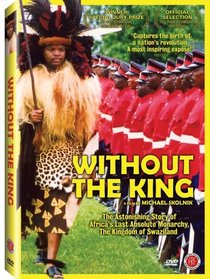| Actors: King Mswati III, Queen LaMbikiza, Princess Sikhanyiso Director: Michael Skolnik Genres: Indie & Art House, Educational, Documentary Sub-Genres: Indie & Art House, Educational, History Studio: First Run Features Format: DVD - Color,Widescreen - Subtitled DVD Release Date: 07/22/2008 Original Release Date: 01/01/2008 Theatrical Release Date: 01/01/2008 Release Year: 2008 Run Time: 1hr 24min Screens: Color,Widescreen Number of Discs: 1 SwapaDVD Credits: 1 Total Copies: 0 Members Wishing: 1 MPAA Rating: Unrated Languages: Swedish Subtitles: English |
Search - Without the King on DVD
  | Without the King Actors: King Mswati III, Queen LaMbikiza, Princess Sikhanyiso Director: Michael Skolnik Genres: Indie & Art House, Educational, Documentary UR 2008 1hr 24min Winner of the Special Jury Prize at the Hot Docs International Documentary Festival, this acclaimed films tells an astonishing story of Africa's last absolute monarchy, the Kingdom of Swaziland. King Mswati III, a distant ... more » |
Larger Image |
Movie DetailsSimilarly Requested DVDs
|
Movie ReviewsRecommended for anyone interested in contemporary Africa James Higgins | 03/27/2009 (4 out of 5 stars) "The `King' in the title is Mswati III, the ruler of the small, landlocked southern African nation of Swaziland. Swaziland is desperately poor, overpopulated, and ravaged by HIV; the prevalence of infection exceeds 40 %, the highest rate in the world. Many people rely on international food aid to avoid starvation. Much of the country's problems can be traced to the fact that since 1973 it has been ruled by Mswatis' father, and then Mswati himself; although there is a parliament, it essentially consists of sycophants who carry out the King's orders. The film has three narrative threads: one deals with the King; another with his eldest child, 18 year-old Princess Sikhanyiso; and the third, with a group of dissidents battling to overthrow the monarchy and bring a genuine democracy to the country. The King is hardly a despot in the traditional African mode of an Idi Amin, a Robert Mugabe, or a Macias (Nguema) Biyogo. He is a rather affable man, with an indolent disposition, who shows every sign of being bored by his country's many problems. He is fixated on his three main pastimes. One involves buying things - fleets of SUVs, limousines, and, early on in the film, a $45 million corporate jet (!) When the off-screen interviewer questions the wisdom of this decision, Mswati disingenuously states that he can't help it if the Swazi parliament wants to buy jet planes for the benefit of their Beloved Majesty ! The King's other pastime is being feted by large crowds of citizens at full-on, `ooga - booga' ceremonies where everyone wears a knee-length toga-like robe with colorful designs, clutches a stick in one hand, and shuffles around the grounds of the stadium chanting in Bantu. The King, featuring what looks like tufts of crepe paper or dyed fabric sticking out of his close-cropped afro, beams in the adulation of his subjects. The King's third pastime revolves around satisfying his sexual appetite. At the start of the documentary he has 12 wives, and during the course of filming acquires a 13th, a pubescent girl younger than Princess Sikhanyiso. His first wife, Queen LaMbikiza, a woman with a lugubrious demeanor, is interviewed by the film crew; she is not happy with the `wife' situation. When not uttering Christian platitudes about Perseverance in bad times, the Queen relates that jealous extended family members have accused her of trying to murder Mswati by spiking his food with poison ! It appears that the King, having sired numerous progeny (23 at last count) with the first cohort of wives, no longer engages in copulation with them, instead preferring to mate with his newer wives (or at least until they, too, have birthed some requisite number of offspring). But all the wives evidently have access to nice clothes, and the best in weaves, extensions, and hair relaxers, for those select times when the King should approach them with coitus on his mind. The camera crew follows Princess Sikhanyiso as she departs Swaziland and attends Biola College, a small Christian fundamentalist campus in La Mirada, California. While she obviously has been sheltered to a large extent, the Princess is a likeable girl; she is fully at home with American hiphop culture, and has a sense of humor. While she is loyal to her father, as the documentary unfolds she is pictured as coming to a realization of the enormity of the problems confronting Swaziland, and to a reluctant understanding of the utterly ineffectual way her father's regime has attempted to address the situation. The segments dealing with the lives of the impoverished citizens of Swaziland are, as one might expect, understated but effective rebukes of Mswati III's rule. We are shown footage of people eating and drinking rather unpalatable things; a shack houses a large group of fly-covered AIDS orphans who gnaw on chunks of bread while staring, with telling apathy, at the camera. The dissidents engage in street marches and tangle with the Swazi police; while a brave group, it is unclear if they have the necessary popular support, or logistical support from an outside agency or country, to achieve their goal of a justly governed nation. The film tries to end on an optimistic note, as youthful conscience awakens to the unsettling magnitude of Swaziland's difficulties. However, anyone who has followed contemporary African affairs, or read Robert D. Kaplan's `The Coming Anarchy', will probably remain unconvinced that things will change for the better in Swaziland in the near future. I recommend this documentary to anyone interested in Africa, AIDS, and the Third World. But be prepared to come away from viewing it with an understanding that things are going to get worse, much worse, before they get better..... " The Last King International Traveler | KY, USA | 09/15/2008 (4 out of 5 stars) "A good film that catches many of the issues in Swaziland which the King is not dealing with."
|



![Shutter Island [Blu-ray]](https://nationalbookswap.com/dvd/s/64/7464/247464.jpg)





